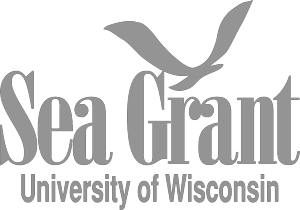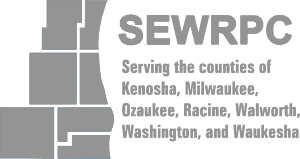
Wisconsin Sea Grant supports coastal resilience through research, outreach, and education.
University of Wisconsin Sea Grant Institute
Who Are They?
Sea Grant is a federal-university partnership between the National Oceanic and Atmospheric Administration (NOAA) and university-based programs in each U.S. coastal state as well as Puerto Rico and Guam. The Sea Grant network is highly interdisciplinary, consisting of 3,000 scientists, engineers, public outreach experts, educators, and students to help citizens better understand, conserve, and protect coastal resources. Sea Grant is specifically interested in promoting healthy coastal ecosystems, sustainable fisheries and aquaculture, resilient coastal economies, and environmental literacy and workforce management.
The Wisconsin Sea Grant (WISG) Institute is a state-wide program hosted at the University of Wisconsin-Madison in their Aquatic Sciences Center with extension and field offices in Green Bay, Kenosha, Manitowoc, Milwaukee, Stevens Point, and Superior.
How Does Wisconsin Sea Grant Support Coastal Resilience?
Through research, outreach, and education, WISG provides background and expertise on coastal processes and engineering, recommendations and best practices for managing Great Lakes coastlines, and communication of coastal hazards risk.
Two of WISG’s nine key focus areas directly address building coastal resilience:
Coastal Processes and Engineering
Resources related to
-
-
- coastal hazards
- coastal engineering
- watershed planning
- harbor dredging
- infrastructure
- water safety
- coastal solutions
-
Resilient Coastal Communities
Resources related to
-
-
- community planning
- green infrastructure
- coastal bluffs
- flood resilience
- coastal storms
- coastal beaches
- coastal hazards
- water levels
-
Resilient coastal resilience educational videos
In addition to these key focus areas, WISG works across disciplines to develop projects that address resilience more holistically. For example, engineering specialists will work with WISG’s climate, tourism, water quality, and education specialists.
Research
WISG supports research that addresses Wisconsin’s coastal communities’ needs and can be applied to outreach and education efforts. WISG supports research that improves understanding, awareness, and assessment of:
- Changing Great Lakes conditions and hazards and the implications to their communities,
- How sediment supply from coastal bluffs influences beach and nearshore sediment transport in order to guide sound shore protection and bluff stabilization choices and build more resilient coastal communities and economies,
- The impacts of increased climate variability and change on coastal communities, and
- The impacts of human activities on Great Lakes water quality and supply, as well as coastal and nearshore habitats.
Additionally, WISG supports research that enhances the development and application of
- Green infrastructure practices,
- Geodesign methods to promote resilient coastal communities and understand the consequences of alternative development scenario, and
- Community planning and visualization tools that demonstrate the benefits, risks and impacts of land use on the coastal environment.
Moreover, WISG supports research that documents and preserves
- cultural and historical resources in coastal and marine areas, including those within or adjacent to the proposed marine sanctuary.
Example: Bluffs, Beaches and Bars: Modelling the Hydrodynamics of Shoreline Erosion and Sand Transport in Southwestern Lake Michigan
This Bluff, Beaches and Bars research project will collect topobathy and nearshore wave data to create a hydrodynamic model that can couple offshore sediment transport with onshore erosion. These model results will be used to develop wave run-up and bluff erosion estimates that can be applied throughout the region to erosion, accretion, and sediment transport related questions and challenges.
Outreach
WISG works to get the right information to the right people in a usable format so they can make informed decisions about managing the coastline.
WISG employs extension agents to connect Wisconsin universities to the public. These specialists teach communities how to apply technical information provided by the universities and they relay the needs of Wisconsin’s communities back to the universities.
Additionally, WISG creates, sustains, and leverages partnerships with other agencies and organizations tackling coastal resilience needs. WISG forms partnerships at all levels – from federal and state agencies to regional organizations, non-profits, educational institutions, local municipalities, and community groups – to build capacity in Wisconsin to address coastal resilience needs by sharing resources, expertise, and approaches to addressing coastal hazards.
The Wisconsin Coastal Management Program, University of Wisconsin Sea Grant Institute, University of Wisconsin-Madison Department of Civil and Environmental Engineering, and the Southeastern Wisconsin Regional Planning Commission were awarded a three-year NOAA Coastal Resilience Grant to enhance community capacity in southeastern Wisconsin to build resilience to coastal hazards. This project provided resources and assistance to southeastern Wisconsin communities in Ozaukee, Milwaukee, Racine, and Kenosha Counties to plan and prepare for coastal hazards.
There were four components of this project:
- Evaluating shoreline recession data and scenarios
- Creating guidance products on risk reduction strategies
- Identifying and implementing local resilience opportunities through a small grants program
- Organizing a community of practice within the four target counties
Education
Each Sea Grant program has their own website that provides relevant information, educational material, news, and program information.
WISG publications, including books, research projects, fact sheets, and guidance documents are available on the Aquatic Sciences Center’s Publications website. These resources are free (or available for a minimal cost) and downloadable to make the information easily accessible.
The publications are organized by topics, many of which support coastal resilience in some capacity such as coastal engineering, coastal communities, maps, climate change, water safety, and more. These educational materials provide technical background on coastal processes and engineering as well as practices for addressing coastal hazards, and considerations for planning. Each publication is tailored to a specific audience, such as decision-makers, municipal staff, or property owners, to make the information as useful as possible.
Example: A Property Owner’s Guide to Protecting Your Bluff
A Property Owner’s Guide to Protecting Your Bluff is a WISG risk communication resource. It educates Great Lakes coastal bluff property owners on how to maintain and enhance the stability of their bluffs, as well as recognize obvious signs of bluff stability issues that may need further attention. This resource can be found in the ‘coastal engineering’ topic and is available to download for free.
Connect with Wisconsin Sea Grant
WISG is active in supporting coastal communities addressing coastal hazards and building their resilience. Visit WISG’s website to learn more about their work related to coastal resilience as well as about their work addressing other Great Lakes issues and topics not covered here. Home page.
Sea Grant also provides direct access to Sea Grant experts. Click this link to contact a Sea Grant expert.




